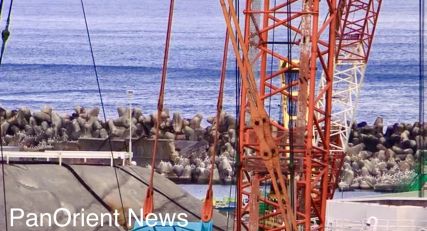|
|
Environment
Greenpeace: Dumping Fukushima Radioactive Water Not Popular in Japan
Wednesday, October 2, 2019

Tokyo- (PanOrient News) An online survey commissioned by the environmental organization Greenpeace showed that only about 13% of Japanese surveyed support dumping diluted radioactive water into the Pacific Ocean, the option seemingly favored by the Japanese government for dealing with over 1 million metric tons of contaminated water in Fukushima.
“We deliberately set out to try and understand the level of understanding Japanese citizens have, what they were thinking and why,” said Shaun Burnie, senior nuclear specialist at Greenpeace. “They show only a small percentage approve of discharging to the Pacific Ocean, and by a wider margin, most oppose.”
Since the meltdown at the Fukushima Daiichi nuclear power plant in 2011, water that has been used to keep the damaged reactors from melting has mixed with groundwater, leading to the accumulation of nearly 1,000 tanks of contaminated wastewater. As storage space is set to run out in a couple years, Japan has been grappling with how to best dispose of it. Besides dumping it in the ocean, proposed solutions include vaporizing, burying and continuing to store it above ground.
The Greenpeace poll, which was carried out by Rakuten Insight, asked 3,000 Japanese adults from Fukushima Prefecture, Niigata Prefecture and wider Japan about their knowledge of the contaminated water issue and how they felt about proposed solutions. While most showed at least some knowledge of the problem, overall those surveyed were less clear about how it should be handled.
Poll results showed that approximately half of responders expressly disapproved of dumping the contaminated water into the ocean, although the solution was slightly more favored by those in Fukushima. The poll also showed that over half of those surveyed weren’t sure what the best solution to the problem would be.
While most of the radioactive contaminants can be removed from the water, tritium presents difficulties. But although tritium is difficult or impossible to remove, depending on whom you ask, it occurs in nature and scientists say that water containing it should be safe to release when adequately diluted.
Nonetheless, concerns about releasing the water have been raised. Some, including neighboring South Korea, are worried about the safety risk, such as to seafood. Others are simply concerned about the potential impact the bad press could have on Fukushima’s fishing industry, already only a fraction of what it was before the 2011 disaster.
Greenpeace, which has brought up the issue to diplomats at the United Nations Human Rights Council in Geneva, believes that the international aspect of the issue is important to bear in mind, and interprets poll results as support for its preferred solution of storing the water.
“The people of Japan are sending a message to the government that they will not accept deliberate radioactive pollution of the marine environment,” said Burnie. “The Abe government has the means to end this by making the only justifiable decision – commit to no discharge and instead decide on long term storage and processing.”
© PanOrient News All Rights Reserved.
|
|

